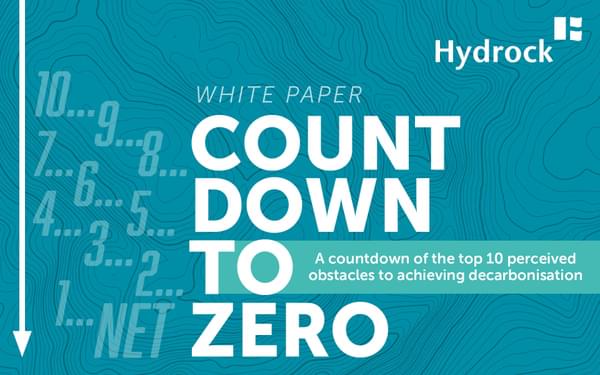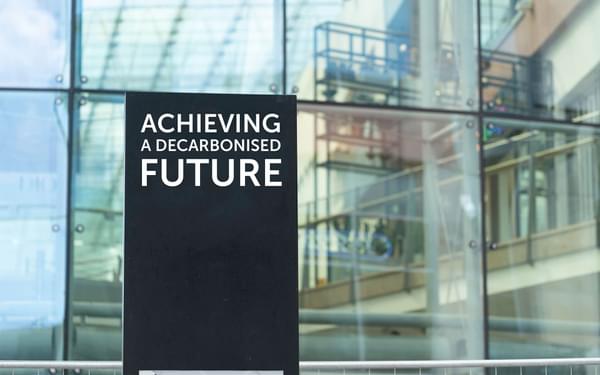New global sustainability reporting standards herald consistency

“ Globally recognised standards means everyone's responsibility is judged on a consistent basis. ”
2024 marks the implementation of two new globally-applicable reporting standards. Sustainability-focused IFRS S1, and climate-focused IFRS S2.
A hugely positive outcome of COP-26 in Glasgow was the formation of the International Sustainability Standards Board (ISSB). These new complementary standards are a product of the board's work, absorbing the very best of a multitude of existing standards.
For investors and corporates, this brings welcome consistency to ESG-related reporting. Apples are being compared with apples.
The next step for corporate organisations, large and small, is to bring consistency and action to the way they understand, and address their environmental impacts.
International Financial Reporting Standards
Deep breath. Let's work our way through all the acronyms to understand what's new for 2024 and why in the world of global sustainability reporting.
What's new?
- The International Sustainability Standards Board (ISSB) was formed from COP-26 and is an independent, private-sector body whose purpose is to harmonise sustainability reporting and reduce complexity and confusion.
- The ISSB works under the International Financial Reporting Standards (IFRS) Foundation whose role is to develop sustainability-related financial reporting standards for investors.
- From the ISSB's assessment of all the various reporting standards in existence, they announced two new global standards in June 2023 for application by investors and corporate business from 2024 - IFRS S1 and IFRS S2.
- They are designed to be applied together and to complement one another.
- They provide a global baseline of sustainability-related disclosures for the capital markets. They are …
- International Financial Reporting Standards S1 - General Requirements for Disclosure of Sustainability-related Financial Information - designed to apply globally to all corporates in all sectors, it's the core baseline of sustainability reporting.
- It aims to better unify disclosures on factors such as waste and emissions.
- It sets out how companies can link sustainability-related and financial information.
- By providing a common way for sustainability-related risks and opportunities to be disclosed, it helps investors compare and contrast and decide where to make investments.
- It's effective for annual reporting periods on or after 1 January 2024.
- International Financial Reporting Standards S2 - Climate-related Disclosures - this is more detailed around climate mitigation and climate adaptation.
- It sets out requirements for identifying, measuring and disclosing information about climate-related risks and opportunities that helps investors decide where to invest.
- It is designed to be used with IFRS S1.
- The focus is on climate-related physical and transitional risks which could affect a company's cash flow, access to finance or cost of capital.
- It's effective for annual reporting periods on or after 1 January 2024.
What are IFRS S1 & S2 based on?
The standards are based on four 'content areas':
- Governance
- Strategy
- Risk management
- Metrics and targets
These 'content areas' are influenced by the four pillars of disclosure under the Task Force on Climate-related Financial Disclosures (TCFD). This demonstrates how the new standards consolidate existing disclosure frameworks, recognising key elements and taking recommendations from these other organisations.
In addition to TCFD, the standards take recommendations and guidance from:
- Sustainable Accounting Standards Board (SASB)
- Climate Disclosure Standards Board framework (CDSB)
- Value Reporting Foundation's Integrated Reporting Framework
- World Economic Metrics
They also inter-change information with the Global Reporting Initiative's (GRI) standards to reduce the reporting burden for companies, as well as the newly published Taskforce on Nature-related Financial Disclosures (TNFD) framework. Indeed, the 14 TNFD recommendations are also consistent with IFRS S1 and S2 and are structured around the same four pillars.

What does this mean?
Before we return to our analysis of what corporates need to do, a few headlines on what this change means, set against the complex landscape that had existed until this point:
- As new global standards, IFRS S1 and IFRS S2 have been developed by consolidating existing voluntary initiatives.
- If you have already adopted TCFD reporting, you will be well-placed to report to these new standards.
- The new standards are perfect for providing information needs to investors and other providers of capital. The GRI is best used to deliver sustainability reporting to all other stakeholders.
- The UK, the EU and other major nations worldwide, whilst endorsing the new standards, will apply specific country or trading bloc requirements, but generally all should be compatible.
- The UK announced it will develop standards for company sustainability disclosures by July 2024, and the aim is for information disclosed under the UK SDS to be globally comparable to ensure effective decision-making across international markets.
- Organisations have one additional year to include Scope 3 information in these reporting standards in recognition of the complexity and time required to map a complete value chain.
- The new standards are proportionate in their requirements to reflect the size of a company, so less is required of small and mid-size businesses.

How corporate organisations can embrace the new IFRS standards
A universally recognised set of standards for both sustainability reporting and climate risks is welcome for any corporate business that wants to remain relevant in our ever-changing world.
The new IFRS standards offer a benchmark and a means of recognition to secure vital capital and funding.
But with Scope 3 emissions highlighted in particular under 'metrics and targets', these new standards shine a light on the importance of establishing structure, purpose and validation to transition any business to a low-carbon, socially responsible and climate resilient place.
"Vision, data, stakeholder engagement, an appreciation of change, and measurement. These are the critical parts of how any organisation reports successfully against these new international standards" says Sadaf Askari.
Demonstrating clear governance, strategy, risk management, and targets and metrics around sustainability and exposure to climate risk will make a positive impression when investors compare 'apples with apples' under these new reporting standards.
Sustainability reporting check-list
At a very high-level, it means corporate organisations need to:
- Have a vision and a purpose for how they will be relevant and responsible in an ever-changing world.
- Have a documented process for gathering all relevant data to complete Scope 1, 2 and 3 emissions studies, complete with a baseline, an end goal and a strategy for effecting change to reduce all emissions over a set time period.
- Understand all their stakeholders and their requirements, to be socially conscious and inclusive.
- Engage positively with their supply chain to communicate, support and effect change.
- Assess the risk to their business and assets from climate change and set in motion adaptation strategies.
- Have in place recognised and accredited methods to verify and validate all their achievements, which in turn will be core to the reporting under the IRFS standards.

Supply chain engagement - the key part of the jigsaw
The engagement piece with supply chains is critical to Scope 3 emissions data. This specific data helps investors and the finance community to assess the transitional risks of the companies in their portfolios.
Reputational, legal, market, technological and regulatory risks are the areas of most concern to the investor community. These are transitional risks.
Understanding how these risks play out in a supply chain, and doing something about it, is of fundamental importance in meeting these international reporting standards. It's why taking the supply chain with you on your journey to be a more responsible business is key.
Addressing labour practices, understanding how waste is minimised, ensuring data is secure, improving the energy performance of real estate, appreciating how goods are assembled and packaged - these are all important issues to understand in a supply chain. Through positive, collaborative engagement, organisations can drive improvement.
The new IFRS standards for sustainability and climate-related disclosures will help bring consistency and transparency to the way corporate business plays its significant part in mitigating and adapting to climate change. These standards will provide a platform for responsible investment in the types of business who will truly shape our future world.













